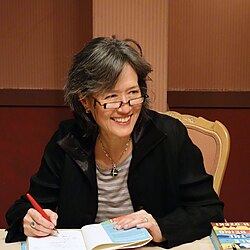Ruth Ozeki Quote
Few boys have been as fortunate as I, raised into manhood with only the gentlest of words and blandishments in my ears and the kindest of caresses upon my person, by a mother who sheltered us from everything that is harsh and ugly in this world. I was spoiled, utterly unprepared for cruelty, and perhaps this sounds like I'm complaining, but I'm not! You mustn't think I blame you. I'm afraid I must sound like the most ungrateful son in the world, when in fact the opposite is true. I am more grateful now than ever for the way you raised us, teaching us the value of kindness, of education, of independent thinking and liberal ideals, in the face of the fascism that is sweeping our country. The cruelest punishments now fail to bring even a tear to my eye, but the thought of the hardship you've suffered on behalf of your ideals makes me weep like a baby.
Few boys have been as fortunate as I, raised into manhood with only the gentlest of words and blandishments in my ears and the kindest of caresses upon my person, by a mother who sheltered us from everything that is harsh and ugly in this world. I was spoiled, utterly unprepared for cruelty, and perhaps this sounds like I'm complaining, but I'm not! You mustn't think I blame you. I'm afraid I must sound like the most ungrateful son in the world, when in fact the opposite is true. I am more grateful now than ever for the way you raised us, teaching us the value of kindness, of education, of independent thinking and liberal ideals, in the face of the fascism that is sweeping our country. The cruelest punishments now fail to bring even a tear to my eye, but the thought of the hardship you've suffered on behalf of your ideals makes me weep like a baby.
Related Quotes
About Ruth Ozeki
